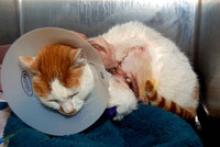Trap, Neuter and Return for Feral Cat Day
We have a great story about a feral cat and me in our family. To sum it up briefly, I attempted to lure one into our car one evening in the drive-thru of a fast food restaurant, much to the delight of the rest of the passengers in the car. The cat declined my invitation of French fry morsels, and now the running joke when we see a feral cat is if I’m going to get out and try to “catnap” it or not.
Looking back, I know my heart was in the right place, but what if that cat had been dangerous? My child was in the car, after all! While I shouldn’t be prowling the streets, trying to abduct and “save” homeless cats in our already pet-filled home, there are still things that I can do for feral cats in general, and I hope that you are moved to do so, as well.
October 16 is National Feral Cat Day. To participate, all you need is an open mind and a caring heart for cats.
One thing that’s great for feral cats, who are actually often rather happy and healthy on their own terms, is the Trap-Neuter-Return program. This allows the cats to continue living the lifestyles they have lived—without harming any humans due to their wildness and possible inability to be adopted—without reproducing.
We know that reproduction of cats and dogs is simply off the charts and needs to be controlled; there are so many abandoned critters out there that wouldn’t have been tossed away into a life of suffering if their parents had been spayed or neutered. But feral cats that are neutered can also take care of themselves in the wild. Natural predators, they can fend for themselves, eat, sleep, and live happy lives—without a cluster of kittens, that is.
I know that sounds like a heartless mother ready to abandon her triplets and run off to be a waitress in Reno, but for feral cats, it’s the truth; they get impregnated by other feral cats and then must care for a litter in the wild. And while Mama Kitty may have enough resources and food for herself, she suddenly has to share with six more kittens, who will either die on her or force her to become unhealthy as she cares for them. It’s a lose-lose situation for all involved.
That’s why it’s so important to have spaying and neutering clinics, especially Trap-Neuter-Return, which fixes feral cats and then released them back to their homes in the wild.
To learn more about the program and to get involved, click here.





